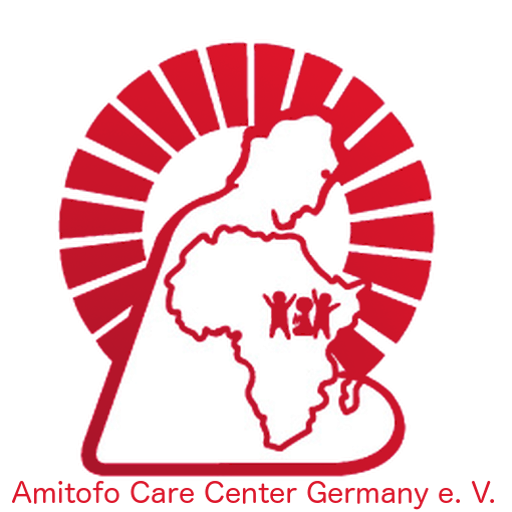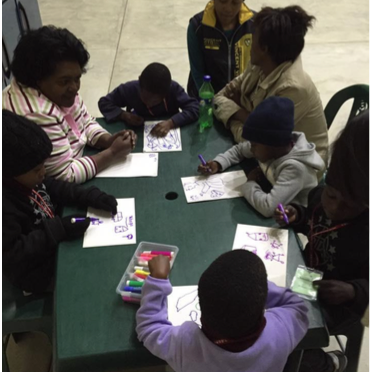Lecture on 18.02.2018 for the New Year Celebration
at the Amitofo Care Centre Germany e.V.
In Düsseldorf
2 Months at Amitofo Care Centre of Namibia (abbrv. ACC Namibia or Centre)
Report by Beatrix von Eycken
Page 4:
The children and Buddhism
Buddhism is virtually non-existent in Namibia. Most Namibians are Christians. Many are very religious. ACC Namibia is a Buddhist organization and lives up to its values. For example, no meat are eaten. But Buddhism also means that it is up to the children to decide for themselves to take refuge in the Buddha. You have the chance to get to know Buddhism. A proselytization does not take place. The goal of ACC is to educate respectful, educated, and tolerant people who are open-minded to other cultures and faiths.
There is a morning and an evening ritual for the children to attend and there is instruction in ethics and meditation. However, the director herself is very respectful with regard to the faith of the children. This tolerance is also reflected in the fact that not all Asian employees are Buddhists – nor are I.
The contributions
All life that is created and kept here is 100% donated. The food per person for one day costs: breakfast 2 NAM $, lunch 4 NAM $, dinner 2 NAM $. Ca, 15 NAM $ are 1 Euro. When I was there, about 90 people (including the employees who live in Okahandja) received meal at noon. The plan is to supply 300 children in the future. More employees are needed. In addition, the costs for personnel, land, fleet, clothing, …
And that’s not all: ACC Namibia also supports Namibian society outside the centre- By 3 soup kitchens with food.
When I was there, a container came, full of various things and objects. Apart from clothes, herbs and many other things, there was a table for table tennis. The joy was huge. But there were also wheelchairs. ACC distributes these wherever is needed. The procedure is the same as for the children: everyone can register their needs and then there are individual cases. In all this, one feels the great responsibility to the donors to handle the gifts with the utmost care.
The ethical claim
In general, the ethical aspiration that ACC enjoys in Namibia is admirable. This not only concerns the handling of the donations, but also all other sectors of life. It begins with not bowing to the ubiquitous corruption. Laws are followed and no loopholes are sought to avoid them. If a mistake is made, it is acknowledged and corrected. In the German economy, we often talk about the need for a positive culture of mistakes. ACC Namibia lives it.
Situation on site
This ethical aspiration is upheld in a country where corruption is omnipresent. I’m from Germany and I’ve never realized what corruption means for everyday life. When I read an SMS with a money claim for a public service, I first laughed. Until I realized what it really means: no security.
Planning security is also a difficult topic. For example, Due to lack of funds in 2017, the school year at public schools will be shortened by 2 weeks at short notice. The state could not have paid the teachers. Since ACC Namibia is oriented to the public schools, the school year was shortened here as well. Many plans had to be changed.
Namibia is a poor country, despite its immense mineral wealth. Unemployment is high, between 25 and 30%. The distances are huge. When ACC Namibia places a job advertisement for cleaning staff in the local newspaper, people from all over the country apply. For the job interviews they accept long journeys. There is basically no public transport, i. e. people use the transportation opportunities that are offered. So they are already 3 days on the road, to appear on the agreed interview date in the Centre, “neat and tidy”. The talks last sometimes less than 30 minutes, because if a candidate is very thick or you see joint problems already in her way to move, a cleaning job is meaningless. Of course, people notice this. Then comes the despair. Often silence. Tears in the eyes and softly spoken words. “I do anything if I can only work”. And then they go. In her best clothes. Back on the long journey, which will probably cost her her last money.
High unemployment makes it difficult for foreign organizations to bring foreign workers to Namibia. The own workforce should be protected. This makes it extremely difficult to obtain work visas. This also applies to volunteer work. Man does not want too much work to be done free of charge by foreigners, thus depriving the inhabitants of further opportunities to find work for a small wage. On the other hand, foreigners can of course bring expertise. It is a real tightrope walk.



